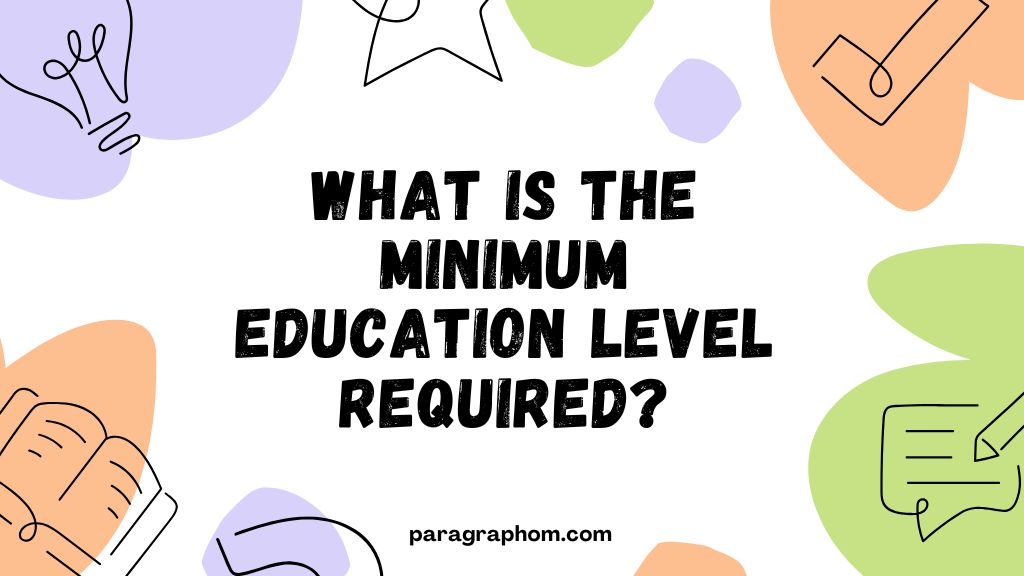When it comes to pursuing a career or even considering a new job, one of the most common questions asked is: What is the minimum education level required? Education is an essential part of our lives. It helps us gain knowledge and skills that prepare us for the challenges of the real world. Different jobs and industries require different levels of education. Some careers only need a high school diploma, while others may require a college degree or specialized training.
In this blog, we will explore what the minimum education level required for different fields is and why education plays such an important role in shaping our future.
Why is Education Important?
Education is the foundation of our personal and professional development. It helps us build knowledge and critical thinking skills that are important for success. The level of education we have can influence the types of jobs we can apply for, our income, and how much we can grow in our careers.
Some jobs, like those in manual labor or entry-level positions, might not require high levels of education. However, for more technical or specialized roles, higher education can make a significant difference. Knowing what education level is needed for a specific field is essential, as it helps you make informed decisions about your career path.
Also read: What is the Difference Between Shareholder and Stakeholder?
What is the Minimum Education Level Required for Various Jobs?
The minimum education required for a job depends on the industry, the role, and the employer’s specific needs. Let’s look at some common career paths and their typical educational requirements.
1. Entry-Level Jobs (No Formal Education Required)
Some jobs do not require any formal education at all. These roles may involve manual labor, retail work, or customer service. Many of these jobs offer on-the-job training, meaning you learn the necessary skills while you work. Examples of such jobs include:
- Retail Workers
- Delivery Drivers
- Warehouse Workers
For these positions, the minimum education level may simply be a high school diploma or even no education beyond basic literacy skills. These types of jobs are often a good starting point for people who want to begin earning money right away without spending years in school.
2. High School Diploma or Equivalent
Many jobs require a high school diploma or its equivalent (like a GED). A high school diploma is the most basic level of education and can open the door to various entry-level jobs. These jobs might involve administrative tasks, sales, or customer service. Common careers that require only a high school diploma include:
- Administrative Assistants
- Sales Representatives
- Customer Service Representatives
In some cases, additional certifications or training might be needed to advance in these fields, but a high school diploma is often the bare minimum.
3. Post-Secondary Education (College or Vocational Training)
For more technical or specialized roles, employers often look for candidates who have completed some form of post-secondary education, such as college or vocational training. This education helps individuals gain specific skills that are necessary for certain industries. These jobs may require an associate degree, a certification, or a bachelor’s degree.
- Technicians (e.g., HVAC, medical lab technicians, or dental hygienists) typically need vocational training or an associate degree.
- Paralegals may need a certificate or an associate degree in paralegal studies.
- Web Developers and other technology-related roles may require specialized technical training or a degree in computer science.
A two-year degree or a certification in a specific trade can provide you with the skills to enter a profession that offers more opportunities for career growth and higher pay than a high school diploma alone.
4. Bachelor’s Degree
Many professions require a bachelor’s degree, which typically takes four years to complete at a college or university. A bachelor’s degree offers in-depth knowledge and skills related to a specific field. With a bachelor’s degree, you can apply for a wide variety of professional jobs in areas such as business, healthcare, and education. Some examples of careers that require a bachelor’s degree include:
- Teachers (elementary, middle, or high school)
- Nurses
- Marketing Specialists
- Software Engineers
- Accountants
A bachelor’s degree is often necessary for advancing in many career paths. It opens doors to managerial or higher-paying positions and is often the minimum education level required for competitive industries.
5. Master’s Degree or Higher
For certain advanced careers, particularly in fields like law, medicine, or research, a master’s degree or higher may be required. These degrees are typically pursued after obtaining a bachelor’s degree and can take an additional two to four years to complete.
- Doctors (M.D. or D.O.) and dentists (D.D.S.) must complete medical school after earning a bachelor’s degree.
- Lawyers must attend law school and pass the bar exam after obtaining a bachelor’s degree.
- Researchers or university professors often need a PhD, especially in fields like science, engineering, or humanities.
These advanced degrees can be demanding, both in terms of time and financial commitment. However, they are necessary for those who wish to pursue careers that require specialized knowledge and expertise.
Also read: Why Are Net Costs of Higher Education Different From Sticker Prices?
Factors That Affect the Minimum Education Level
While certain careers generally require specific levels of education, there are other factors that can influence what is needed:
1. Experience vs. Education
In some fields, employers value experience just as much, if not more, than formal education. For instance, in creative industries like writing, design, or photography, a strong portfolio or demonstrated skills might outweigh the need for a college degree. Similarly, in certain technology roles, hands-on experience and the ability to demonstrate technical skills can sometimes be more important than having a formal education.
2. Company Policies
Different companies have different requirements. Some companies may be willing to hire individuals with less formal education if they have relevant experience or if they are willing to undergo training. Others, however, might have strict policies requiring certain degrees or certifications.
3. Location
The minimum education required can also vary based on location. For example, some countries or regions may have different expectations for job candidates, and the education system in that area may influence what is considered necessary for a specific job.
Also read: What is Project Blue Beam?
Conclusion
the minimum education level required depends on the job you want and the industry you are aiming to work in. While some roles only need a high school diploma or no formal education at all, others may require vocational training, a bachelor’s degree, or even advanced degrees. Education is important because it prepares us for the workforce and gives us the skills needed to succeed in various careers.
Understanding what the minimum education level is for your chosen field can help guide your career decisions and ensure you are ready for the challenges ahead. Whether you are just starting your career or thinking about going back to school, it’s important to know what education you need to succeed.

